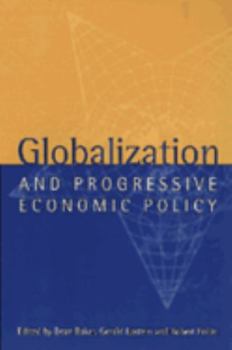Globalization and Progressive Economic Policy
Select Format
Select Condition 
Book Overview
In Globalization and Progressive Economic Policy, thirty-six prominent economists analyze the impact of the emerging global economy on our national sovereignty and standards of living. Does globalization cause inequality? Instability? Unemployment? Environmenal degradation? Or is it an engine of prosperity and wealth for the vast majority of the world's citizens? The authors analyze problems, institutions and possible government responses, and conclude...
Format:Paperback
Language:English
ISBN:0521643767
ISBN13:9780521643764
Release Date:November 1998
Publisher:Cambridge University Press
Length:532 Pages
Weight:1.68 lbs.
Dimensions:1.3" x 6.0" x 9.0"
Customer Reviews
3 ratings
Interesting but not systemetic
Published by Thriftbooks.com User , 23 years ago
I read this book in a graduate class on globalization. The word ¡®progressive¡¯ in the title refers to the perspective of political economy ie, not the one of neoclassical or neo-liberalist. Arguments from economists, in particular political economists on globalization are somewhat hard to see. Authors focused on side effects of globalization. Their perspectives vary but they can be labeled as the view of ¡®race to the bottom¡¯ against optimistic views of neo-liberalist. It¡¯s interesting to see what should be done against hard economic trend, globalization from the perspective of losers not winners. And this book has wide coverage from IMF, World Bank to TNCs, Global financial market, inequality. But I should point out some weakness of the book.1. They doesn¡¯t offer any explanation on what caused the globalization at all. Globalization is presented as mere background to draw their conclusions. Some Marxist schools explained the process of globalization in terms of the diminishing rate of profit. But this book lacks such logics. I think the purpose of this book, offering alternative policy to speed down the process of globalization, drove authors in that direction. 2. My major is not economics but economic sociology. So I had some difficulties to follow all lines of the economists. But it¡¯s not wholly my fault. I have had no such difficulty with economic journals like The Economist. The explanation of economic phenomena which are mainly macroeconomic one, is not kind to reader. I think authors assumed that this book would be read by expert policy makers not by mundane students.
Against the globalisation bogy
Published by Thriftbooks.com User , 23 years ago
In this excellent collection, 37 contributors from around the world study the World Bank, the IMF, the multinational corporations, movements of capital, goods and labour, and the possibilities of national economic renewal. David Felix points out that the financial liberalisation of recent decades has led to slower growth of output, investment and productivity. Mehrene Larudee observes that Mexico, for instance, grew 6% a year with the industrialisation and protectionist policies of 1951-81; when it joined NAFTA, the economy, jobs and wages all shrank. Ha-joon Chang suggests that workers in multinational corporations have a far stronger bargaining position than employers make out. These firms often threaten to move, but rarely do. They have high sunk costs in physical plant, infrastructure, subcontracted production networks and services, skilled workers, local knowledge. Workers can take control of our workplaces, industries and countries. We can impose capital controls and reinvest the wealth we create in productive industry. `Globalisation', like the idea of God, is a ghost to frighten us. Eban Goodstein proves that protecting the environment does not destroy jobs, contrary to employer propaganda. Gregory DeFreitas argues against an open borders policy, while also opposing racial biases in immigration policy. He notes, "emigration represents a subsidy to the receiving country from the nation that trained them, as well as a loss of valuable talents to their homeland."Arthur McEwan sums up the book's findings: "The neo-liberal regime that is being imposed on the world economy by the Bretton Woods institutions, the US government and other powerful public and private actors is doing a great deal of damage. It is a regime that harms people in all sorts of ways in the name of economic growth, but it does not even do very well at providing economic growth. The reign of neo-liberalism has not come about as some inevitable historical process, but has been actively constructed by the powerful actors that gain from its establishment. Alternatives exist, and the alternatives tend to work better."
Alternatives to Neoliberalism
Published by Thriftbooks.com User , 25 years ago
Neoliberalism is bankrupt and corrput! This book offers the most sensible near and medium term policy options and solutions that will benefit both humans and nature until Global Capital wakes up to it's REAL responsibilities. The ecoonomic data and analysis exhibit robustness and considerable explanatory power. The prescriptions are excellent recipes for realistic change...






